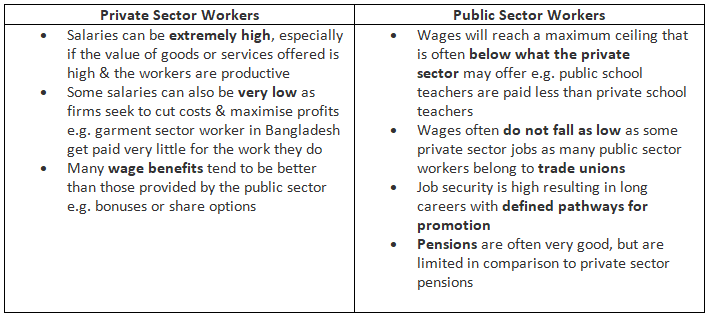Class 10 Exam > Class 10 Notes > Economics for GCSE/IGCSE > Wage Differentials
Wage Differentials | Economics for GCSE/IGCSE - Class 10 PDF Download
Reasons for Differences in Pay
Workers are paid different amounts (wage differentials) due to a number of factors, including:
- Gender pay differences
- Industrial sector pay differences
- Private & public sector pay differences
- Differences in pay between skilled & unskilled workers
Reasons for Wage Differentials Between Men & Women
- Men typically engage in full-time employment, while women often opt for part-time roles to balance work and childcare responsibilities.
- Men commonly experience continuous career progression, whereas women frequently pause their careers for family obligations, missing chances for career growth.
- Women are more inclined to accept jobs below their skill level to accommodate childcare duties.
- The gender pay gap represents a discriminatory practice where women receive lower pay than men for the same job.
Reasons for Wage Differentials in the Primary, Secondary & Tertiary Sectors
- Primary Sector: Workers in the primary sector typically receive lower wages due to the basic skill requirements of their jobs. Profits from raw materials are generally minimal within the production chain.
- Secondary Sector: Employees in the secondary sector enhance the value of raw materials, leading to higher profits from the sale of products. Consequently, wages in this sector are usually higher than those in the primary sector.
- Tertiary Sector: Workers in the tertiary sector command the highest wages. Their roles demand specialized skills that necessitate years of training. The goods or services they offer are often intricate and expensive, such as those provided by artificial intelligence developers.
Question for Wage DifferentialsTry yourself: What are some reasons for wage differentials between men and women?View Solution
Reasons for Wage Differentials Between Private & Public Sector Workers
- Public Sector: Entities in the public sector are owned and overseen by the government.
- Private Sector: Private sector establishments are owned and managed by private individuals or companies.
Reasons for Wage Disparities Between Private and Public Sectors

Reasons for Wage Differentials Between Skilled & Unskilled Workers
- Many economies feature a surplus of unskilled labor, leading to a situation where employers can drive wages down due to the availability of workers willing to accept lower pay rates.
- Acquiring specialized skills requires significant investments of time and money, resulting in a limited supply of specific skill sets. Consequently, wages for skilled workers are typically higher.
The document Wage Differentials | Economics for GCSE/IGCSE - Class 10 is a part of the Class 10 Course Economics for GCSE/IGCSE.
All you need of Class 10 at this link: Class 10
|
56 videos|97 docs|38 tests
|
FAQs on Wage Differentials - Economics for GCSE/IGCSE - Class 10
| 1. What are the main factors that contribute to differences in wage levels among employees? |  |
Ans. The main factors that contribute to differences in wage levels among employees include education level, experience, industry, location, and negotiation skills.
| 2. How does gender play a role in wage differentials? |  |
Ans. Gender can play a significant role in wage differentials, with studies showing that women generally earn less than men for the same work due to factors such as gender bias and discrimination.
| 3. Are there any laws or regulations in place to address wage differentials? |  |
Ans. Yes, there are laws such as the Equal Pay Act and Title VII of the Civil Rights Act of 1964 that aim to address wage differentials and prohibit discrimination based on factors such as gender, race, and ethnicity.
| 4. How can employees negotiate for fair wages? |  |
Ans. Employees can negotiate for fair wages by researching industry standards, highlighting their skills and accomplishments, and being prepared to discuss their value to the company during salary negotiations.
| 5. What can companies do to reduce wage differentials within their organizations? |  |
Ans. Companies can reduce wage differentials within their organizations by conducting regular pay audits, implementing transparent salary structures, and providing training on unconscious bias to ensure fair compensation practices.
Related Searches















